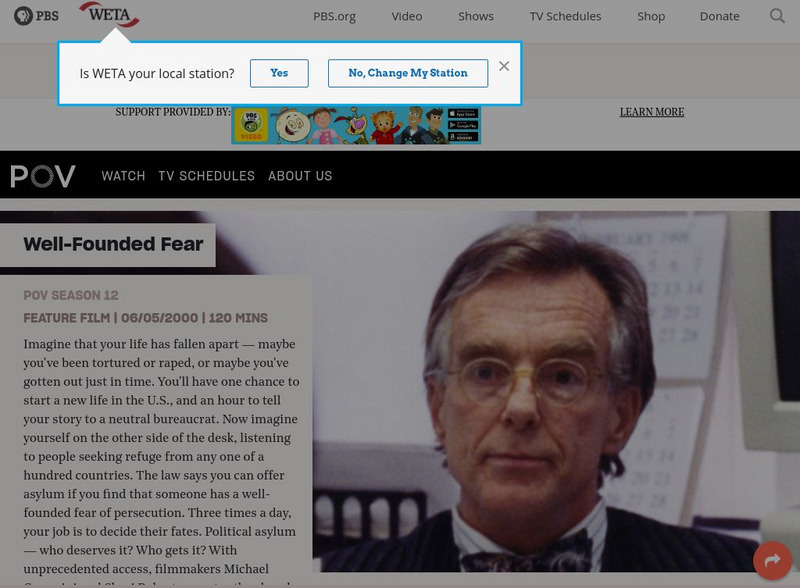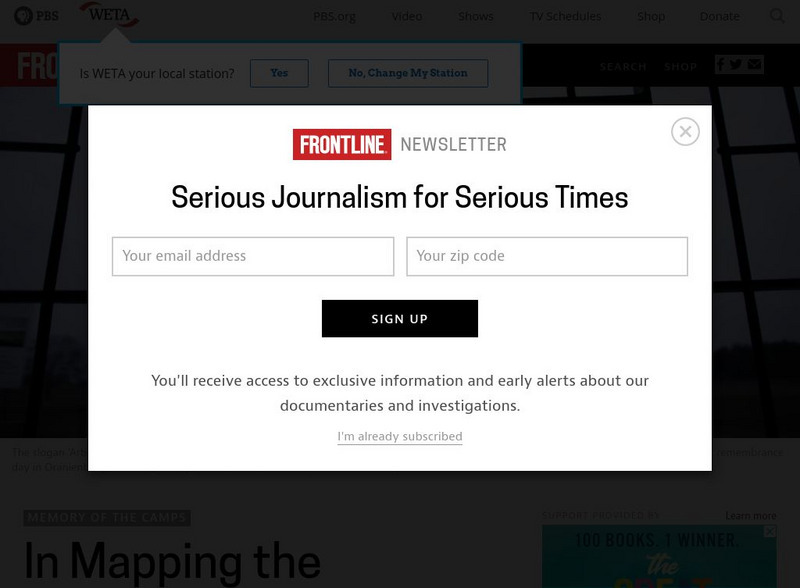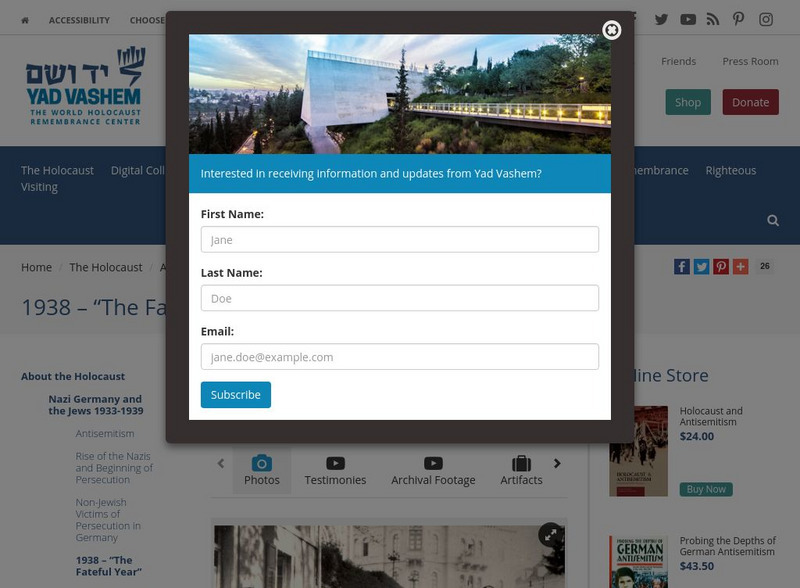Hi, what do you want to do?
US Holocaust Memorial Museum
U.s. Holocaust Memorial Museum: Sobibor
A description of the Nazi concentration camp at Sobibor in Poland, and of the prisoner uprising there.
US Holocaust Memorial Museum
U.s. Holocaust Memorial Museum: Treblinka
A description of the Nazi development and use of the extermination camp at Treblinka in Poland during World War II.
US Holocaust Memorial Museum
U.s. Holocaust Memorial Museum: Westerbork
Article about the camp at Westerbork, the Netherlands, originally created by the Dutch to intern Jewish refugees, but later used as a transit camp by the Nazis, a holding place for Jews being sent to other concentration camps.
US Holocaust Memorial Museum
U.s. Holocaust Memorial Museum: Drancy
A description of the Nazi development and use of Drancy, a former police barracks in Paris, as a transportation camp for deporting Jews to extermination camps.
US Holocaust Memorial Museum
U.s. Holocaust Memorial Museum: Raoul Wallenberg and Rescue of Jews in Budapest
The story of Raoul Wallenberg, the Swedish diplomat who worked to save Hungarian Jews from deportation to Nazi extermination camps late in World War II.
US Holocaust Memorial Museum
U.s. Holocaust Memorial Museum: Jasenovac
Article about the concentration camps established by the Nazis in the area around Jasenovac in Croatia, and their use in eliminating political and religious opponents, as well as Jews shipped in from other places in Eastern Europe.
US Holocaust Memorial Museum
U.s. Holocaust Memorial Museum: Holocaust Encyclopedia: Rescue
In spite of the great risk, many non-Jewish people across Europe undertook rescue operations, both great and small, to hide or remove people persecuted by the Nazis, especially Jews. This article discusses some of the most notable efforts.
US Holocaust Memorial Museum
Ushmm: Holocaust Encyclopedia: Women During the Holocaust
The roles of Jewish women and women of other groups targeted by the Nazis is described, but the article also tells of the roles many women played in the various resistance movements during World War II.
US Holocaust Memorial Museum
U.s. Holocaust Memorial Museum: Bergen Belsen
An article about the history of the Bergen-Belsen camp complex and the varied roles it played in the Nazi efforts to imprison a wide variety of populations throughout World War II.
US Holocaust Memorial Museum
U.s. Holocaust Memorial Museum: Dachau
Article about the Dachau concentration camp which housed almost 200,000 prisoners, both political and ethnic, in the period between 1933, when the Nazis took power in Germany, and mid-1945 when the Allies liberated the camps.
Other
Hiding Jewish Children During World War Ii: The Psychological Aftermath
An eye-opening article that describes the psychological consequences for Jewish children who were sent to the Netherlands to live in hiding from the Nazis, for their parents, and for the surrogate parents who hid them during the war....
Other
Holocaust (Shoah) Research Resources
Site offers extensive research resources regarding the Holocaust of World War II. This site has won awards from the History Channel and Encyclopedia Britannica.
PBS
Pbs: America and the Holocaust: Kristallnacht
From the larger PBS site, America and the Holocaust. This essay describes the atrocities of Kristallnacht, November 9, 1938, across Germany. Find out what precipitated the violence against Jews all across Germany, and discover how the...
US Holocaust Memorial Museum
U.s. Holocaust Memorial Museum: Voyage of the St. Louis
An article about Jews fleeing the Third Reich on the transatlantic liner the St. Louis in 1939.
US Holocaust Memorial Museum
U.s. Holocaust Memorial Museum: The Story of Raphael Lemkin
An article about Raphael Lemkin, a Polish Jew who emigrated to the U.S. at the beginning of World War II. As a lawyer and scholar, he documented Nazi atrocities and coined the word "genocide."
Other
National Foundation for Jewish Continuity: The Ss St. Louis Project
Here's a piece of American history you problably know little about. In 1939 a ship filled with Jewish refugees sat off the coast of Miami waiting for permission to land. That permission was denied. Find out what happened to the...
PBS
Pbs Teachers: Well Founded Fear (Lesson Plans About Asylum Seekers)
Two lesson plans about asylum seekers, one of which is based on the case of the SS St. Louis, an ocean liner of Jewish refugees seeking asylum from Nazi persecution in 1939. The lessons let students discuss how U.S. immigration and...
PBS
Pbs: Mapping the Holocaust
When Allied forces reached the concentration camps in WWII, they were not prepared for the devastation that they saw. The soldiers filmed what they witnessed and Frontline used the footage in the documentary Memory of the Camps [57:35]...
Yad Vashem, The World Holocaust Remembrance Center
Yad Vashem: 1938 "The Fateful Year"
1938 has been deemed "The Fateful Year" because Jewish persecution escalated. Jewish passports were revoked, Kristallnacht occurred, and Jewish property was forcibly taken. Read a summary and view primary sources such as photos,...
US Holocaust Memorial Museum
Ushmm: Holocaust Encyclopedia: Racism
An explanation of the term "racism" and how it impacted the rise of Nazism and World War II.
American-Israeli Cooperative Enterprise
Jewish Virtual Library: The Evian Conference
Read about the Evian Conference, a meeting of thirty-two countries which gathered in 1938 to address the question of Jewish refugees from Germany. The result of the meeting was very disappointing.
US Holocaust Memorial Museum
Ushmm: Holocaust Encyclopedia: Genocide of European Roma (Gypsies)
Article detailing the persecution and annihilation of much of the European Roma population under Nazi orders during World War II, and the continued persecutionof the remaining Roma population in many countries after the war.
Other
Anne Frank House
Museum, devoted to all aspects of Anne Frank's life and her famous diary, makes available a walk-through recreation of the annex where Anne hid from the Nazis. Also includes an interactive timeline filled with wrenching details of the...
University of South Florida
Holocaust: People: Sinti and Roma
This page discusses in detail what happened to the persecuted Romani people during the Holocaust. It also provides links to further content about lives of Roma and Sinti people during this period.













